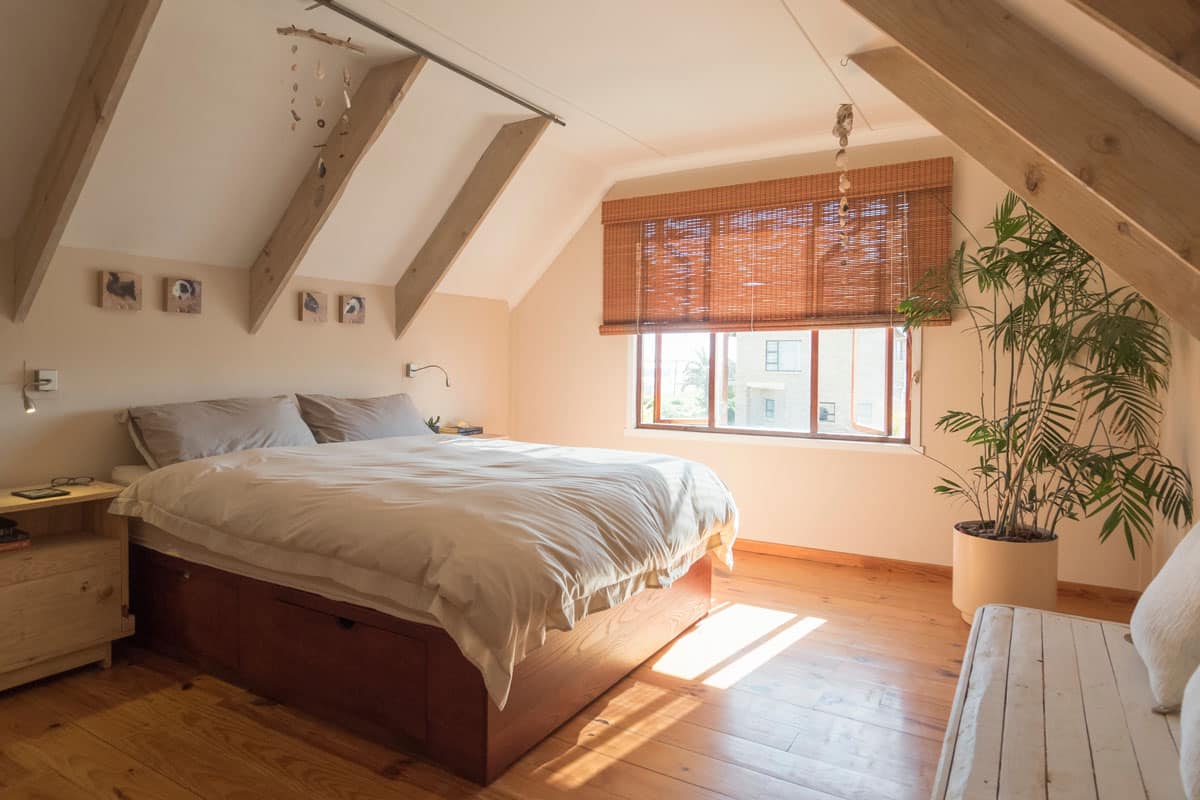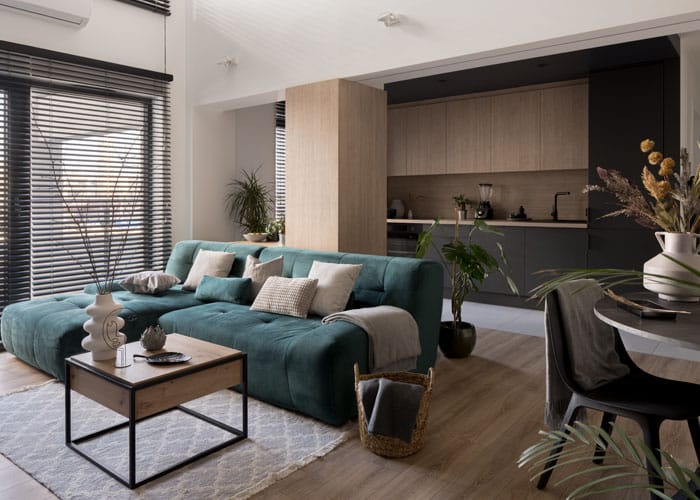Investing in Serviced Accommodation: A Comprehensive Guide
Serviced accommodation has become very attractive to landlords and property investors in recent years, with both apartments and houses being popular and in high demand. Here’s our guide to what you need to know if you are considering this property strategy and investing in serviced accommodation short-term lets.
Contents
- What is serviced accommodation?
- Types of serviced accommodation
- What type of guests would you expect?
- The pros of investing in short-term lets
- The cons of investing in short-term lets
- Are short-term lets a good investment?
- London's 90 day rule
- Setting up a serviced accommodation property
- What should a serviced let include?
- What professional services do you need
- What type of mortgage is needed?
- Should you invest in serviced accommodation?

-
by Robert Jones, Founder of Property Investments UK
With two decades in UK property, Rob has been investing in buy-to-let since 2005, and uses property data to develop tools for property market analysis.

What is Serviced Accommodation (short-term lets)?
The meaning of serviced accommodation (also known as short-term lets) combines the comforts of home with hotel-style amenities. These fully furnished, self-contained properties cater to business travellers, tourists, contractors, and relocating professionals, offering flexible stays from days to months. Properties typically include bedrooms, living rooms, fully-equipped kitchens, and private bathrooms, along with Wi-Fi, laundry facilities, and housekeeping services. Located in central areas, they provide easy access to everything a guest needs on their doorstep without the downsides of hotels or long-term tenancies.
The sector has seen significant growth as investors see how profitable this niche strategy can be, and more people recognise the benefits of this cost-effective alternative to traditional hotels, particularly for extended stays or family travel.
This growth has been accelerated by platforms like Airbnb, Vrbo, Expedia, and Booking, which have simplified the process of finding and managing your serviced accommodation.
The extra income is a serious reason to consider this property investment strategy compared to many others, even with the increased costs to purchase a suitable house.
Types of Serviced Accommodation Investment
The UK serviced accommodation market features three main professional formats:
- Serviced Apartments - Professional apartment buildings with hotel-style services
- Aparthotels - Purpose-built properties combining hotel services with apartment living
- Corporate Housing - Long-term furnished rentals designed for business stays
We have chosen not to cover the more classic Airbnb-style rental houses in the following subsections, as they represent the most common form that serviced accommodation takes and are already widely recognised. Instead, we aim to provide a comprehensive understanding of the other specialised serviced accommodation alternatives available in the UK, which may offer unique benefits and advantages to travellers seeking a more tailored experience.
Serviced Apartments
Serviced apartments are a type of accommodation that offers guests a blend of the comforts of home with hotel-like services. They are fully furnished apartments available for short-term or long-term stays, providing daily conveniences, housekeeping, and other services within the rental price.
Serviced apartments are typically more spacious than hotel rooms, offering separate living rooms, bedrooms, and fully equipped kitchens. They are often located in residential or commercial buildings and can vary in terms of budget and amenities the offered.
Here are some key features of serviced apartments:
- Space and Privacy: Serviced apartments provide guests with more space to relax and privacy compared to hotel rooms. They are ideal for those who want to entertain guests, host dinners, or enjoy a more homely atmosphere.
- Cost-Effectiveness: Serviced apartments offer similar amenities and levels of luxury as hotels but at a lower cost, especially for long-term stays. The ability to cook meals and avoid dining out also contributes to cost savings.
- Convenience and Comfort: Serviced apartments offer the convenience of hotel services, such as housekeeping and concierge, combined with the comfort and privacy of a fully furnished apartment. This includes separate living areas, bedrooms, and well-equipped kitchens.
- Target Audience: Serviced apartments cater to a diverse range of travellers, including business professionals, tourists, and families. They are particularly popular among those seeking a comfortable and cost-effective alternative to hotels for extended stays.
- Amenities: Serviced apartments typically include essential amenities such as Wi-Fi, television, washing machines, and fully equipped kitchens. Some may also offer additional facilities like gyms, swimming pools, and on-site restaurants.
- Flexibility: Serviced apartments offer flexibility in terms of length of stay which is a great option for a short-term let. This makes them suitable for various travel needs, from business trips to leisure vacations.
Aparthotels
Aparthotels are a contemporary form of accommodation that blends the comforts of home with the conveniences of a hotel. They are typically located in purpose-built buildings or refurbished structures in prime urban, business, or tourist areas.
Aparthotels are a hybrid of hotels and serviced apartments, offering guests the comforts of a fully furnished apartment with hotel-like services. These accommodations usually consist of self-contained units, including studios and one or two-bedroom apartments, each with a kitchen or kitchenette, living area, and private bathroom. Some may also feature outdoor spaces like balconies or gardens.
The main difference between a hotel and an aparthotel is the level of space, privacy, and amenities offered. While hotels provide guests with individual rooms, aparthotels offer entire apartments. Aparthotels often include additional facilities such as gyms, co-working spaces and sometimes even play areas.
The flexibility of aparthotels makes them attractive to various types of travellers, including business professionals, families, and groups of friends. They offer a cost-effective alternative to traditional hotels, especially for extended stays, as guests can prepare meals in their own kitchens and save on dining out.
Aparthotels provide guests with the freedom and independence of a holiday apartment while also offering daily room cleaning, linen changes, and, in some cases, breakfast. They combine the professionalism and comfort of a hotel with the amenities and space of an apartment or guest house.
The rise of aparthotels can be partially attributed to the rise of remote workers, where travellers seek a blend of hotel services and the comforts of vacation rentals. They are particularly popular among "bleisure" travellers.
Corporate Housing
Corporate housing is a term used to describe the rental of furnished apartments or houses, usually for a month or longer. It is an alternative to traditional hotels or extended hotel stays, offering comfort, privacy, and convenience.
Corporate housing is designed to meet the needs of business travellers, relocating employees, military personnel, interns, and individuals or families displaced by natural disasters or home renovations. It provides a "home-away-from-home" experience, with fully-equipped kitchens, separate living areas, and hotel-style services such as housekeeping and concierge.
The benefits of corporate housing include larger living spaces compared to hotel rooms, full customer service, and cost savings, especially for extended stays. Unlike extended-stay hotels, which are often surrounded by parking lots and filled with transient guests, it offers a stable residential setting.
The average stay in corporate housing is around one month, with some stays exceeding 100 days. The revenue generated by the corporate housing industry in the UK was £815 million in 2020-21, indicating a growing demand for this type of accommodation.
Companies such as National Corporate Housing and Urban Stay offer corporate housing options in the UK, providing fully furnished apartments with essential amenities and services. These companies cater to business travellers, individuals, and families seeking comfortable and convenient accommodation for short or extended stays.
What Type of Guests Would You Expect?
Serviced accommodation is popular among a diverse range of guests, including:
- Business travellers: Serviced accommodation offers a convenient and flexible alternative to hotels for business travellers who need to stay in a location for an extended period. They offer a comfortable and private space to work and rest while providing essential services like housekeeping and 24/7 customer service.
- Tourists and holidaymakers: Serviced accommodation can be a great option for tourists and holidaymakers looking for a comfortable and convenient base from which to explore a new city or region. They often offer more space and privacy than hotels and provide access to essential amenities like kitchen facilities, laundry facilities, and communal areas.
- Relocating professionals: Serviced accommodation can be an excellent option for professionals who are relocating for work and need a temporary place to stay while they search for a more permanent home. They offer a flexible and convenient option for short-term stays and can be more cost-effective than hotels or traditional rental properties.
- People undergoing medical treatment: Serviced accommodation can be an ideal option for people who are undergoing medical treatment and need to stay in a location for an extended period. They offer a comfortable and homely environment and can provide essential services like housekeeping and access to amenities like laundry facilities.

The Pros of Investing in Short-Term Lets
Here are some of the possible advantages of investing in serviced accommodation:
- Strong rental income potential. Achievable rents from serviced accommodation are generally much higher than they would be for letting similar accommodation on a long-term let. For example, a property let on a long-term rental at £750 PCM could potentially achieve £750 per week on a short-term let, making it a potentially very profitable strategy.
- Strong yield potential. Serviced accommodation offers high yield potential. A property let on a short-term let should achieve a much higher rent but will cost the same to buy as a property let on a long-term let. Knight Frank says that the profitability of the serviced apartment sector outperforms the regional UK hotel market. They say that serviced apartments achieved a GOP margin of 43% for the 12 months to May 2022.
- Serviced accommodation is a growing sector within the accommodation market and there are possible gaps in the market to be exploited. As the sector is fairly new many places do not yet have a sufficient supply of serviced accommodation, or not enough to satisfy growing demand. The recent Global Serviced Apartment Industry Report says that serviced apartments are more popular than ever. They add that while large corporates’ use of hotel accommodation is falling, their use of serviced accommodation is increasing.
- Increased bookings and search with new technology, it is easier than ever to find and manage serviced accommodation stays. For example, platforms such as Airbnb, Vrbo, Expedia and Booking can all be used to market your serviced accommodation and manage bookings and guest experiences.
- Tenancy laws and regulations in short-term lettings are broadly advantageous to landlords. Serviced accommodation is generally let on an informal licence basis rather than an Assured Shorthold Tenancy or AST. Guests in serviced accommodation do not have any security of tenure, any rights to occupy the property long term, nor benefit from other tenancy rights. It is easy for landlords to terminate a short-term let, evict tenants should it be necessary and sell their property and exit the market if they wish to.
- Serviced accommodation may offer possible tax benefits. For example, with serviced accommodation that is self catering it may be possible to make a saving by paying business rates instead of council tax.

The Cons of Investing in Short-Term Lets
Here are some of the possible disadvantages of investing in serviced accommodation and short-term lets:
- Serviced accommodation is usually fully furnished. This is likely to include furniture, soft furnishings, kitchen appliances and equipment etc. So setting up serviced accommodation in the first place will require a larger initial capital outlay than a traditional buy-to-let. The original outlay wear and tear and repair/renewal costs are likely to be higher too.
- Serviced accommodation by definition needs to be serviced. Housekeeping services, such as towel changes, linen changes and cleaning will need to be provided on a regular basis. This may be daily or several times per week. You will need to make arrangements to provide service and budget for this in your costs. Property management for short-term lets is much more extensive.
- Overheads will be higher than a property on a longer-term let. With serviced accommodation, the landlord pays the Council Tax or similar. Serviced accommodation lets normally include all utility bills, TV and Internet costs etc. in the rent.
- Leasehold issues as properties owned on a leasehold basis may have restrictions within the lease that prevent or restrict short-term lets and serviced lettings. Investors should check before investing in property for short-term let investments.
- Mortgage finance issues. Most lenders have restrictions on serviced lets and short-term lets in properties with residential or buy-to-let mortgages. It may be necessary to use specialist finance to buy or refinance, which is likely to be more expensive.
- VAT considerations as Value Added Tax is chargeable on serviced accommodation lets, but is not on long-term AST lets. If you have a portfolio of properties that crosses the annual vat thresehold for revenue this can be a significant impact to your budgeting.
- Local restrictions for planning or licensing as some areas have or are introducing planning restrictions which prevent or limit property owners from letting their property on a short-term let basis. They may do this through landlord and property licensing regulations or via planning controls. One area that is impacted by this is London. Unless planning permission is obtained, London property investors are restricted to renting their property short-term for a maximum of 90 nights in a calendar year.
Are Short-Term Lets a Good Investment?
Similar to holiday lets, the yields and return on investment (ROI) for a serviced accommodation property investment can be much higher than any other strategy. So the answer to the question "Is serviced accommodation profitable?" is often yes. It does of course depend on the location, the quality of management and the asset costs, but here is a typical example.
An Example Yield from a Traditional Long-Term Buy-to-Let
- Purchase price: £200,000
- Monthly rent: £1,000 pcm
- Annual rental income: £12,000
- Gross yield = 6%
An Example Yield from a Serviced Accommodation Short-Term Let
- Purchase price: £200,000
- Potential monthly income: £2,250 (at 70% occupancy)
- Average nightly rate: £107
- Annual rental income: £27,000
- Gross yield = 13.5%
To break this down further:
- At 70% occupancy (a fair target for well-managed properties), this means the property is occupied for approximately 255 nights per year
- The same property earning £1,000 per month on a long-term let (£12,000 per year) could potentially generate £2,250 per month as a serviced accommodation let (£27,000 per year)
- This represents a significant increase on the gross rental income through short term stays
Important Note: These figures represent gross rental income. Short term stays typically have higher running costs than traditional buy-to-lets.
London's 90-Day Rule
The 90-day rule for serviced accommodation in London refers to a regulation introduced by the Greater London Authority in 2015. The rule limits the amount of time that a property in Greater London can be rented out as short-term accommodation to 90 days per calendar year.
The rule was introduced to address concerns about the impact of short-term rental properties on the availability of long-term housing in the city. By limiting the amount of time that properties can be used for short-term rentals, the aim is to encourage property owners to rent out their properties on a long-term basis, thereby increasing the availability of affordable housing in the city.
The rule applies to all properties in Greater London that are used for short-term accommodation, including serviced apartments, Airbnb rentals, and other forms of short-term rental accommodation. Property owners who wish to rent out their properties for more than 90 days per year must obtain planning permission from their local council.
It's worth noting that the 90-day rule applies to the property, not the individual owner. This means that if a property is owned by multiple individuals, the 90-day limit applies to the property as a whole, rather than to each individual owner.
The 90-Day Rule in Brief
The 90-Day Rule refers to a restriction on renting out rooms and apartments in London for short-term stays. Specifically, the rule limits the number of days you can rent out a room per year to 90. This regulation is designed to maintain a balance between residential and tourist accommodation in the city.
Strategies for Overcoming the 90-Day Rule
- Change the Property's Classification
If your primary strategy is serviced accommodation and you are determined to rent out a property in London for more than 90 days per year, consider changing the property's classification. London properties are typically classified as C3 (residential dwellings). To bypass the 90-Day Rule, you can apply to the local council to change the property's classification to C1 (hotels and guesthouses).
It is important to note that this process can be time-consuming and costly, and it may not be recommended if you do not own the property outright. However, if you are looking to maximise your profits from London's property market, this legal solution can be worthwhile.
- Rent for Exactly 90 Days During Peak Periods
Another approach is to comply with the rules and rent out your property for exactly 90 days during peak periods. By strategically selecting the most lucrative times of the year, you can still enjoy a healthy return on investment. In fact, 7% of all properties in London are rented out on platforms like Airbnb and Booking.com at some point each year, so there is plenty of opportunity to capitalise on the city's thriving short-term rental market.
- Explore Opportunities Beyond London
One of the best ways to circumvent the 90-Day Rule is to look for investment opportunities outside of London. If you are not tied to a specific location, consider cities like St Albans or Watford, or even venture further north. By keeping an open mind and focusing on areas with more lenient regulations, you can find profitable investment opportunities without worrying about the 90-Day Rule.
London's 90-Day Rule may seem like a significant hurdle for property investors, but with the right strategies in place, you can navigate it effectively. Whether you choose to change your property's classification and apply for planning permission, rent for exactly 90 days during peak periods, or explore opportunities beyond London, in other major cities like Birmingham and Manchester (or even secondary cities like Norwich or Brighton), there are lots of options for investing in serviced accommodation.
Setting Up a Serviced Accommodation Property
Setting up a serviced accommodation property business correctly, involves several steps, including finding the right property, furnishing it appropriately, marketing it effectively, and providing excellent customer service. Here is a general overview of the steps involved:
Find the Right Property: Look for properties in desirable locations that have easy access to public transportation, restaurants, and other amenities. Consider the size of the property and the number of guests you want to accommodate. Make sure there is demand for that style and size in the area you are considering. For example, a 1 bedroom apartment in the city centre might be great, but if your target market is corporate lets, then consider if you need a larger 2 bedroom property to attract companies looking to save on hotel stays when booking accommodation for team members.
Furnish the Property: Furnish the property with comfortable and modern furniture that suits the needs of your target market. Ensure that the property has all the necessary amenities such as a fully equipped kitchen, high-speed internet, and cable TV.
Set up Your Website and Listings: Create a website for your serviced accommodation and list it on various online platforms such as Airbnb, Booking.com, and Expedia. Ensure that you provide accurate and detailed information about the property, including the number of rooms, amenities, and location.
Market Effectively: Promote your serviced accommodation on social media platforms and other relevant online channels. Utilize search engine optimization techniques to improve the visibility of your website and attract more bookings.
Provide Excellent Customer Service: Ensure that your guests receive top-notch customer service during their stay. Respond promptly to their queries and address any concerns they may have. Provide them with a clean and comfortable living environment, and make sure that they have everything they need to enjoy their stay.
Manage Your Property: Manage your property effectively by keeping it clean, maintaining the facilities, and addressing any issues that arise promptly. Consider hiring a property management company to help you with the day-to-day management of your serviced accommodation.
Overall, setting up serviced accommodation requires a significant investment of time and money, but it can be a profitable and rewarding business venture if done correctly.
What Should a Serviced Let Include?
Short-term let investments typically include fully furnished apartments or properties that are equipped with essential amenities and services to make a guest's stay comfortable and convenient. The exact inclusions may vary depending on the provider, but most serviced accommodation should include:
- Furnishings: The apartment or property should be fully furnished, with all necessary furniture and appliances like beds, sofas, tables, chairs, refrigerators, and cooking equipment.
- Housekeeping: Regular cleaning and maintenance services should be provided, which may include cleaning, linen changes, and waste disposal.
- Utilities: All essential utilities like water, electricity, heating, and air conditioning should be provided and included in the rental price.
- Internet and communication: Internet connectivity and communication facilities like phone lines should be provided.
- Security: Serviced accommodation should provide security measures to ensure the safety of tenants and their belongings.
- Access to amenities: Depending on the provider, serviced accommodation may offer access to additional amenities like a gym, swimming pool, or communal areas.
- Flexible terms: Serviced accommodation should offer flexible rental terms to accommodate the varying needs of tenants.
- 24/7 customer service: Serviced accommodation will often provide 24/7 customer service to assist tenants with any issues or queries that may arise during their stay.
- Location: Serviced accommodation is typically located in central locations, close to public transportation, shopping, dining, and entertainment options. Demand for short-term lets is very high in the major cities of London, Manchester and Birmingham.
Overall, serviced accommodation offers a comfortable and flexible alternative to traditional hotels and rental properties, providing a "home away from home" experience for short-term or extended stays.
What Professional Services Do You Need
When setting up a serviced accommodation property, it's crucial to ensure that the property is presented professionally. Here are some professional services to consider:
Cleaning Services: Keeping the property clean and well-maintained is essential to maintaining the satisfaction of guests. Consider hiring a professional cleaning company that specialises in this type of property. This will ensure that the property is always spotless and ready for guests. High guest standards are exceptionally important as reviews on a property (specifically its cleanliness) can make a difference to future bookings.
Photography Services: Good-quality photos are essential for showcasing the property to potential guests. Consider hiring a professional photographer to take high-quality photos of the property. Bookings for this type of accommodation can be very competitive and first impressions count. A quality photo of a key part of the building, bedrooms or outside space can help you stand out and even help increase not just bookings but your nightly rate.
Linen and Laundry Services: Maintaining clean and fresh linens is essential to providing a comfortable and satisfying stay for guests. Consider hiring a professional laundry service to ensure that the linens are cleaned and changed regularly.
Property Management Services: Managing a serviced accommodation establishment can be time-consuming and challenging. Consider hiring a professional property management company that can handle the day-to-day management of the property. This includes guest communication, check-in, and check-out, cleaning, maintenance, and more.

What Type of Mortgage is Needed?
When it comes to financing serviced accommodation in the UK, you may need to consider a few different options. One possibility is a commercial mortgage, which is designed for properties that will be used for commercial purposes, such as serviced apartments. However, commercial mortgages can be more expensive than residential mortgages and typically require a higher deposit, so it's important to shop around and compare rates.
Another option to consider is a holiday let mortgage, which is designed for properties that will be let out on a short-term basis. These mortgages may be suitable for a serviced accommodation that is let out on a short-term basis. However, not all lenders offer holiday let mortgages, and they may have different requirements and criteria than traditional buy-to-let mortgages.
Ultimately, the best financing option for your serviced accommodation will depend on your individual circumstances and the specific lender's criteria. It's recommended that you speak to a mortgage advisor who specialises in bespoke options to help you find the most suitable financing.
Should You Invest in Serviced Accommodation?
In summary, serviced accommodation can offer high rental incomes and yields to property investors, making it a profitable strategy if your target is rental income, especially when compared to standard buy-to-let or other property strategies. However, there are additional costs and expenses that must also be considered.
To help you, if you are considering investing in a short-term let serviced accommodation, we have partnered with an investment agent who helps all our clients with sourcing these properties across the country.
They specialise in high-yielding apartments and houses and have experience with these properties and also provide a solution for a fully managed service. To get access to the best short-term let investments across the UK you can sign up here.
